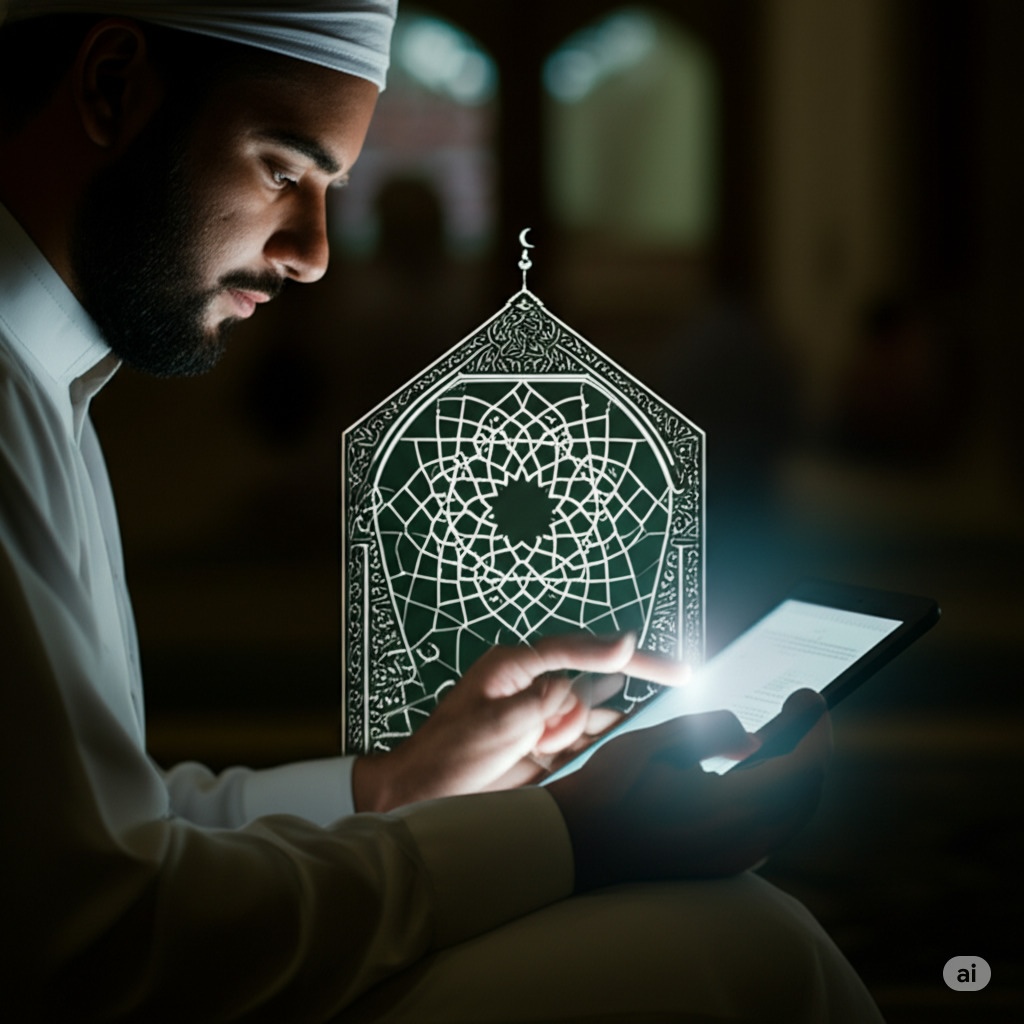In today’s hyper-connected world, the lines between the physical, digital, and spiritual realms often blur. While technology drives most aspects of modern life—from how we communicate and work to how we shop and learn—its influence on our inner lives and spiritual journeys is equally profound. Many people see spirituality and technology as opposites: one rooted in abiding truths, the other in constant change. Yet, when used mindfully, technology can actually deepen faith, foster connection, and support religious practice.
Let’s explore how spiritual life—especially from an Islamic perspective—can engage meaningfully with technology without compromising its essence.
1. Technology as a Tool for Worship and Knowledge
For Muslims, technology offers powerful means to stay connected to ʾIslām (إِسْلَام). Digital Qurʾān (قُرْءَان) apps allow easy access to recitation, and Tafsīr (تَفْسِير) (exegesis). Apps help with prayer times, Qiblah (قِبْلَة) direction, and daily adhkār (أَذْكَار). Online platforms provide access to live khuṫbah (خُطْبَة)s, Islamic lectures, fatwā (فَتَوَى) services, and even Fiqh (فِقْه)-based Q&A from trusted scholars.
Ḣadīth (حَدِيث) and tafsīr (تَفْسِير) databases, once buried in large volumes of Arabic texts, are now searchable and accessible in multiple languages. For the sincere seeker of knowledge, technology is no longer a distraction but a gateway to sacred knowledge.
2. Digital Boundaries and Mindfulness
However, with great access comes great responsibility. Technology can also become a source of distraction, vanity, or heedlessness (ghaflah (غَفْلَة)). Social media, if unchecked, can fuel pride, envy, or addiction to praise. As Muslims, we are taught to guard the heart and our time—two things most vulnerable in the digital age.
Practicing digital mindfulness—intentional tech use aligned with your values—is a spiritual discipline. This includes:
- Scheduling screen-free time, especially before ṡalāh (صَلَاة) and sleep
- Avoiding idle scrolling and gossip online (which can verge on backbiting)
- Using technology to serve a higher purpose: seeking knowledge, sharing daʿwah (دَعْوَة), or serving the Ummah (أُمَّة)
The Messenger of Allāh (الله) ṡalla-llāhu ʿalayhi wasallam (ﷺ), said:
«مِنْ حُسْنِ إِسْلَامِ الْمَرْءِ تَرْكُهُ مَا لَا يَعْنِيهِ.»
Min ḣusni Islām(i) al-marʾ(i) tarkuhu mā lā yaʿnīh.
It means:
Among the excellence of a person’s Islām (إِسْلَام) is his leaving what does not concern him.
[Related by Imām at-Tirmidhiyy (الإِمَام التِّرْمِذِيّ), Ḣadīth (حَدِيث) Ṡaḣīḣ (صَحِيح)]
3. Online Community and Connection
The Messenger of Allāh (الله) ṡalla-llāhu ʿalayhi wasallam (ﷺ), said:
«الْمُؤْمِنُ لِلْمُؤْمِنِ كَالْبُنْيَانِ، يَشُدُّ بَعْضُهُ بَعْضًا.»
Al-Muʾminu lil-Muʾmin(i) ka-l-bunyān(i), yashuddu baʿḋuhu baʿḋan.
It means:
«The believer (muʾmin (مُؤْمِن)) to the believer is like a building (bunyān (بُنْيَان)), each part strengthens the other.»
[Related by Imām al-Bukhāriyy (الإِمَام الْبُخَارِيّ) and Muslim (مُسْلِم)]
Technology allows Muslims around the world to strengthen one another—through virtual communities, online ḣalaqah (حَلَقَة)s, and mutual support. Converts who may feel isolated now have access to mentors, support groups, and educational content. Scholars once out of reach can now deliver courses to thousands at once.
Used with sincerity and structure, online spaces can reflect the spirit of jamāʿah (جَمَاعَة)—shared faith and mutual upliftment—even when physically distant.

4. Ethics and Spiritual Accountability in a Digital Age
Islamic ethics are abiding but must be consciously applied to evolving platforms. Whether dealing with privacy, content creation, or online business, the believer is reminded that Allāh (اللَّه) is aware of all things—online or offline.
We must ask:
- Are we honest in our digital transactions?
- Do we seek fame, or the acceptance of Allāh (اللَّه)?
- Do we maintain ḣayāʾ (حَيَاء) (modesty) and ikhlāṡ (إِخْلَاص) (sincerity) in our online presence?
Spirituality in the digital age means bringing taqwā (تقوى) (God-fearness) to every screen and scroll.
5. Towards a Balanced Integration
The aim is not to reject technology, but to integrate it into a spiritually centred life. A smartphone is not inherently a distraction or a blessing—it depends on how it’s used. Like any tool, it reflects the user’s intention.
Here are practical ways to harmonize tech and spirituality:
- Use reminders for daily duʿāʾ (دُعَاءُ) or adhkār (أَذْكَار)
- Subscribe to channels or podcasts that elevate your ʾīmān (إِيمَان)
- Use online tools to schedule family time, charity, or volunteering
- Set digital intentions: “I use this device to benefit, not to waste”
Conclusion: A Modern Path with an Eternal Compass
At the heart of ʾIslām (إِسْلَام) is a commitment to purpose, sincerity, and acceptance of the Creator. Technology, when used with this foundation, becomes a means—not an obstacle—to a meaningful life.
As we walk the True Path, may we harness the tools of our time to strengthen our faith, benefit others, and remain anchored to what truly matters. Whether you’re building an Islamic blog, sharing reflections, or simply navigating life with your phone in hand—let your spiritual compass guide the way.


